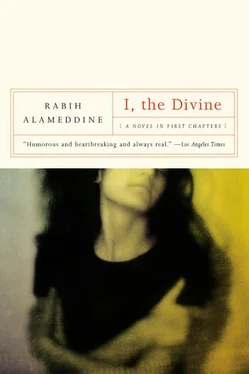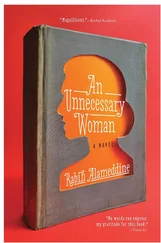“Are you sure you’re all right, ma’am?” he muttered, no longer sure of himself. His hand trembled.
“Yes, I’ll be okay in a few minutes. I’ll just stay here for a bit until this passes.”
“Where are you going, ma’am?”
Go for it, I thought to myself. It was Sunday. “To church.”
“Will you be able to drive?” he asked me, his voice hesitant.
“Yes, just let me catch my breath. I’ll be able to drive as soon as this passes. It always does.” Another loud sob.
“Well, ma’am,” he said, giving me back my license without having looked at it, “please take your time before getting back on the highway.”
“I will, officer,” I said compliantly. “I’ll just wait here for a while.” No ticket, not even a warning, nothing.
He backed away from me, turned around, and practically ran back to his car. He drove out so fast he almost hit another car as he changed lanes. I sobbed and laughed at the same time. Animus meets Anima and runs away in terror. My life story

Unlike me, my sister Lamia was not the sort of person who would attract attention, preferring to blend into the background. She was such an anonymous presence in our family we sometimes forgot she was even there. Though she was the sister closest to me in age, we were not close in any other way. She was a reticent child. She spoke so little many assumed she was a deaf-mute or incapable of understanding our language. Adults spoke to her slowly, loudly, as they would to a foreigner, and she rarely replied unless it was absolutely essential. When she did reply it was aggressively, snapping back at whoever had the audacity to engage her. Every now and then, she surprised us by interrupting, using a polemical tone, disagreeing with what was being said. Her utterances were not usually a statement requiring an argument or further elaboration, simply an assertion of her disagreement like, “You’re wrong,” or “That’s absolutely untrue.” She uttered such remarks whenever my grandmother or my father made a disparaging comment about our missing mother.
My eldest sister, Amal, says Lamia was not always a troubled child. I would not know since she was older than me. I only remember her after her troubles began. Amal remembers her as playful, if not too rowdy, before our parents’ divorce and our father’s remarriage. Our mother’s sudden disappearance was the final in a series of blows that forced her inward. Around herself she wove an impenetrable cocoon from which she never emerged. My father remarried when Lamia was five. By that time, her personality was struck.
Our mother simply vanished. One day, she was not there. Without any explanation or elaboration. “Your mother went back to America,” our father said. That was all. We were supposed to live with that.
I always thought that being the youngest, I suffered the most from my parents’ divorce, but I was wrong. By the time Lamia had succeeded in pulling herself out of our world and was institutionalized, I had come to the realization that I knew little if anything about her. Apparently no one else did either.
Our mother rarely wrote to us. At first we assumed our father had intercepted most of her correspondence. Later on, when I got to know my mother, she explained away her lack of letters as distaste for epistolary communications (her exact words). She did, however, send us cards on our birthdays. Whenever Lamia received hers, she burned the card after reading it. She placed the card in a crystal ashtray, poured rubbing alcohol over it, and lit it with a match, never a lighter. Her eyes bore into the beautiful blue flame. She did not remove her gaze until the flame died out, until the card evaporated.
I had stupidly assumed Lamia hated our mother and blamed her for leaving without an explanation. Lamia had never attempted to contact her or try to visit as I did. Lamia never mentioned her to either Amal or me. After she was institutionalized, Lamia’s husband asked my sister Amal if she would help pack some of Lamia’s things. While doing so, Amal discovered a well-hidden cache of letters. They were folded sheets of papers, no envelopes, no addresses, undated, frayed, having obviously been read many times. All of them were addressed to our mother. All of them in English so our mother would understand them better since her written Arabic was not advanced enough. None of them sent.
The letters spanned thirty-five years beginning the day our mother disappeared and lasting long past the day our mother committed suicide. The first one, written in crayon on a sheet of paper torn from her school notebook, simply stated in a childish handwriting, “Come back, Mommy.” The last, written with her Dupont fountain pen on light blue stationary, was a six-page letter detailing in jumbled, nonlinear prose all that had transpired since the previous letter, all the pain, all the loneliness, all the insanity. In between those two, there were over four hundred and fifty letters, written about once a month, in which Lamia chronicled her life and feelings in a mundane, running conversation.
My sister Lamia was a murderess, a serial killer. She hated her job as a nurse. She thought the patients too demanding so she systematically killed those who most annoyed her while under her care. Her methods were not ingenious, mostly overdosing them. By the time the dust settled, it turned out she had killed seven patients and was suspected of one more death, though the authorities could not prove the last. The first time she was asked about the deaths during the investigation, she confessed to everything. The patients irritated her; she killed them. She gave the authorities as many details as she could remember. Luckily there was no trial. She was declared insane and institutionalized to avoid any further scandal. In actuality, she had killed seven patients and failed in killing two more. She stated so in the letters. She had told our mother about each killing, the reasons, the methods, everything.
Most of the letters are simply ramblings. It would have been clear to anyone who read them that they were the product of a disturbed mind. Unfortunately, no one read them until it was too late, and then we did not dare show them to anyone else. Only my sister Amal, my stepmother, and I read them. Their presence was kept a secret among the three of us. We never told my father.
My sister was what we Druze call a “talker.” It is a difficult word to translate. A talker is one able to say things as a child that related to her past life. Those who follow the Druze faith believe in reincarnation. “Talkers” were not rare among us. She began getting into trouble at the age of three. When she was given a sandwich for dinner, she refused it, saying she would only eat if the dinner table was set, she was too good to be given sandwiches. She told everybody that when she lived in Jabal al-Druze, in Syria, she always had lavish feasts for dinner. She stomped her feet when she was asked to bathe. She wanted her old bathtub, the one with intricate turquoise-colored designs on the side. She asked to be taken back to her husband and children. Usually such behavior is taken with a degree of acceptance among Druze families, allowing the child some leeway until she adjusts to her new life. It is considered normal. Unfortunately, Lamia was insulting the family so she was made to shut up. She was forced to eat sandwiches, use cutlery not made of silver, and bathe in a regular porcelain bathtub. It was at that time that she began to withdraw.
When my grandfather began investigating her previous life — one goes to the area where the “talker” was supposed to have come from and asks around to see who died at the time of the “talker’s” birth — he discovered that what Lamia was saying was true. She had come from a rich, landowning family and had three kids of her own. Apparently she had lived a normal life, married to an ostentatious man who constantly berated her for not being perfect. On the day she died, she took a saber to her husband’s throat, slashed it, and killed herself, leaving her children orphaned. Those in the village from which she came warned my grandfather that if her soul was back, our family should be wary. We were not. My grandfather told my father who told my stepmother who told me. It became a tale, an interesting family story. No one mentioned anything to Lamia. In her letters, though, it was obvious that she knew the exact details of her life in Jabal al-Druze.
Читать дальше













